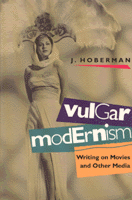Girish Shambu
 1. Easy: my first stirrings of the critical calling can be traced directly back to Pauline Kael's review of Brian De Palma's Dressed To Kill.
1. Easy: my first stirrings of the critical calling can be traced directly back to Pauline Kael's review of Brian De Palma's Dressed To Kill.2. James Monaco's book The New Wave, which introduced me to French film. I read and re-read this book without having seen a single French film!
 3. J. Hoberman's Vulgar Modernism, a collection of his 1980's Village Voice columns. I admired his love of both Hollywood and avant-garde film; his deep awareness of history, politics, and aesthetics; and his bone-dry sense of humor. Later, I had to work hard not to imitate his writing style.
3. J. Hoberman's Vulgar Modernism, a collection of his 1980's Village Voice columns. I admired his love of both Hollywood and avant-garde film; his deep awareness of history, politics, and aesthetics; and his bone-dry sense of humor. Later, I had to work hard not to imitate his writing style.4. I wrote a fan letter to Strictly Film School in the late 90's; the site was a rare and inspirational oasis of world cinema writing on the web. Acquarello's encouragement spurred me to try my hand at writing about film, for Senses of Cinema.
5. The discovery of the filmblogosphere two years ago. Until this point, I had mostly just read a handful of critics in a few high-profile publications. Suddenly I realized the potency of a large and dispersed population, ordinary cinephile folks like me, generating critical thought on cinema, all around the world, 24/7. Ah, the miracle of the Internets!

6 Comments:
I LOVE the James Monaco book. Almost included it in my own list, so thanks for putting it here. I also quite like Monaco's "American Film Now," with its only shortcoming having been its 1979 publication date, thus meaning that it missed out on the bloody denouement of 70s American filmmaking.
Thanks for the tip, Bilge.
I've never seen that one, but I have his How To Read A Film and his book on Alain Resnais, both of which I've found useful.
Girish, I'll second the plug for American Film Now. I read it at a time when I wanted Jaws and George Lucas to be the apotheosis of American film, so in many ways it read like a bitter splash of cold water right in my face. I resisted many of his conclusions for that reason, and although I suspect I still might find his overall approach a bit too cynical (I haven't read it in many years), it's a book frequently think about and have often longed to return to. I suspect I'd be a bit more receptive to his general point of view now... though I still think Jaws is a great movie!
I bought Hoberman's book when it came out. At that time, I had not seen many of the movies he was writing about, but he was eloquent enough on the movies I had seen (even though I disagreed with him on Indiana Jones and the Temple of Doom and Full Metal Jacket, both of which he loathed, in that raised-eyebrow Hoberman way). There was one line in his Temple of Doom review that I still laugh about -- he said the title locale looked "like Maxwell's Plum redecorated by Julian Schnabel."
In 1993, when I'd only been a professional critic for a couple of years, Hoberman's Voice piece on Schindler's List made me so mad that I composed a mammoth (13 page) screed attempting to refute everything he said point by point, starting with his conviction that merely to visualize the genocidal violence of the Holocaust was to demean or tame it. This struck me as absolutist nonsense -- movies may be an imperfect means of remembrance, but unfortunately they're the most popular one we've got, and to declare certain subjects or images off-limits, out of fear that the representation won't do the subject justice, is to ensure cultural amnesia. On top of which, this part of Hoberman's argument didn't jibe with his own defense of some far more graphic (and far cruder) movies on equally epic horrors.
I didn't mail the letter because I remembered Ben Franklin's admonition that anyone who sends a letter of longer than two pages is crazy.
That Hoberman book is very important to me personally for another reason: As far as I can tell, he was the only major American critic to write at length about the films of the Turkish director Yilmaz Guney, who won the Palme d'Or for YOL in 1982. And despite the director's international status, English-language writing on his work is very spare. (I've since tried to do my part, with pieces for Senses of Cinema, among others.) But Hoberman's piece on Guney was and remains invaluable to me to this day. For that I will eternally be grateful.
Dennis, now I just have to get that book...
Matt, what a great story about your letter never sent...
Bilge, ditto for me and the Hoberman book with Ritwik Ghatak, whom not that many Western critics have written about...
Post a Comment
<< Home